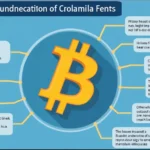Introduction
In a world where decentralized finance (DeFi) is rapidly transforming the financial landscape, the notion of security becomes paramount. This was starkly illustrated in 2024, when an estimated $4.1 billion was lost to DeFi hacks, highlighting the grave challenges and risks investors face. With Bitcoin leading the charge, the advent of Bitcoin DeFi insurance protocols has emerged as a potential game changer for protecting your digital assets. This article aims to unpack these insurance solutions, their significance, and how they integrate into the broader DeFi ecosystem.
Why Bitcoin DeFi Insurance?
Bitcoin and other cryptocurrencies are inherently volatile and susceptible to various risks, including smart contract vulnerabilities, hacking incidents, and systemic risks within decentralized platforms. Insurance protocols can act as a safety net, providing coverage that compensates for certain losses.
Here’s the catch: while these insurance products are a lifeline, understanding their functionality, limitations, and how to effectively integrate them into your investment strategy is crucial for every investor, particularly in emerging markets like Vietnam.
Understanding Bitcoin DeFi Insurance Protocols
Bitcoin DeFi insurance protocols function similar to traditional insurance, but with a few key differences. Here’s how they essentially work:

- Risk Pooling: Providers pool funds from numerous users to mitigate potential losses. If a user suffers a loss due to specific events covered under the policy, the pooled resources are used to compensate that user.
- Decentralized Mechanism: Utilizes smart contracts to automate processes, reducing reliance on central authorities. This autonomy aligns with DeFi principles.
- Flexible Coverages: Users can select coverages tailored to their unique needs, such as covering smart contract failures or protocol hacks.
Key Players in Bitcoin DeFi Insurance
Several protocols have emerged as pioneers in this space, bringing innovative solutions to the market:
- Nexus Mutual: One of the first players, providing coverage primarily for smart contract failures and providing a decentralized alternative to traditional insurance.
- Cover Protocol: Offers peer-to-peer cover against risks in DeFi platforms, allowing users to create and trade insurance contracts seamlessly.
- InsurAce: A multi-chain DeFi insurance protocol catering to diverse blockchain ecosystems, including Bitcoin and Ethereum.
Limitations and Challenges of Bitcoin DeFi Insurance
While Bitcoin DeFi insurance protocols provide necessary protections, they are not without challenges:
- Regulatory Concerns: The decentralized nature of DeFi insurance creates ambiguity in compliance, which can affect operational security.
- Market Awareness: Many users remain unaware of the existence of these insurance protocols, which limits adoption and can leave investments unprotected.
- Pricing Models: Insurance policies may vary widely in cost, and determining fair premiums can pose a challenge for both providers and users.
Investment Environment: The Vietnam Market
In Vietnam, the cryptocurrency user base has been expanding significantly, with a noted growth rate of approximately 200% in just two years. This growth presents a unique opportunity for Bitcoin DeFi insurance protocols to penetrate a market keen on adopting innovative financial solutions. However, as mentioned, raising awareness about these protocols and educating potential users on the importance of such insurance is essential for wider adoption.
The Future of Bitcoin DeFi Insurance
As the DeFi landscape continues to evolve, Bitcoin insurance protocols will likely grow in sophistication and scope. Factors to consider include:
- Integration with Traditional Finance: We may see growth in products that bridge traditional insurance with DeFi insurance, enhancing legitimacy and offering regulatory pathways.
- Advanced Risk Assessment: Utilization of AI and machine learning technologies to automate underwriting processes and assess risk more accurately.
- Enhanced Community Engagement: Insurance protocols need to build a stronger connection with users through educational content and community-driven initiatives.
Conclusion
In conclusion, understanding Bitcoin DeFi insurance protocols is becoming increasingly important for investors looking to safeguard their digital assets. With an ever-evolving landscape filled with threats, these protocols provide an innovative avenue to mitigate risks. As the DeFi ecosystem gains traction, particularly in dynamic markets like Vietnam, embracing security measures like these will be essential to ensure a safer financial future. As always, remember to conduct thorough research and consult local regulators. For further reading and to keep up with the latest trends, visit hibt.com for comprehensive insights.
Expert Author: Dr. An Nguyen, a seasoned blockchain analyst, has published over 20 industry papers and led smart contract audits for renowned projects. officialcryptonews





